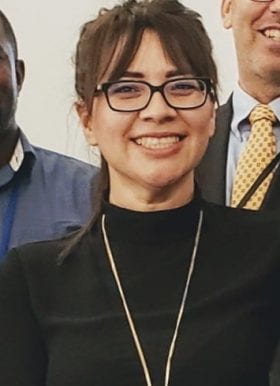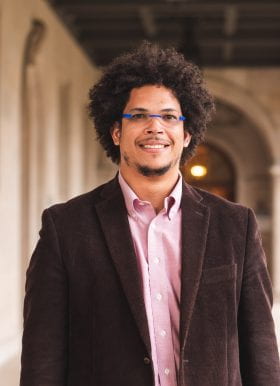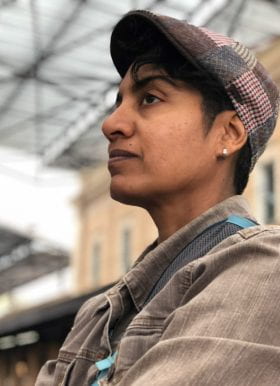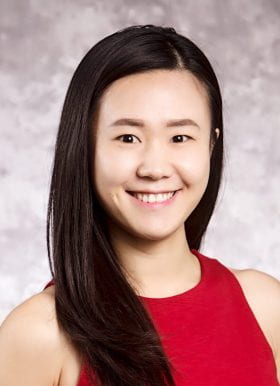
We are no longer accepting applications for this funding opportunity.
The Center for the Study of Race, Ethnicity & Equity invites proposals for projects related to the advancement of the CRE2 research mission and the 2020-2024 CRE2 Programmatic Themes. CRE2 will award up to two Scholar Grants of up to $15,000 in response to this RFP. The principal aim of this program is to assist in the development of scientific, humanistic, and cultural methodologies that can aid the completion of exemplary scholarly enterprises. Priority will be given to research projects that:
- Include early career faculty as principal or co-principal investigators;
- Support undergraduate or graduate assistance in the completion of scholarly activities;
- Focus on areas of critical interest to CRE2, the campus, and St. Louis community;
- Support the continued work of a previously funded CRE2 Research Working Group; and
- Have not previously received CRE2 grant support, with the exception of Small Grants.
Only CRE2 Faculty Affiliates are eligible to apply for grants under this program. Eligibility is limited to one CRE2 grant program per year as principal investigator, with the exception of the Small Grants program.
The submission cycle for Scholar Grants is currently closed.
Project award periods are for 12 months beginning July 1, 2024, with an extension of up to 6 months available upon grantee request and approval from CRE2 leadership.
Proposals must include an Abstract and the following sections: Overview/Aims (200 words); Significance and Innovation (200 words); a Project Description (800 words); Timeline; Budget and Budget Rationale; current CVs for all investigators; and (if applicable) references, description of any human subjects, and appendices.
The Project Description section should (1) discuss how the Scholar Grant will enhance the feasibility of completing a project within 12 months; and (2) include subsections on Foundational Perspectives, Research Questions/Inspiration, Methods, and Data/Materials.
All Scholar Grant proposals that are approved for funding and involve the use of human subjects must obtain appropriate human subjects approval through the University’s Institutional Review Board before CRE2 funds are disbursed.
Project budgets may request up to $15,000 in direct costs to support any activity that directly relates to the successful conduct of the project. There are no indirect costs paid on CRE2 Grants. Budget items may include support for data entry, interviews, data acquisition, access to restricted-use data, travel costs related to data collection or meetings with collaborators, space rental, salary compensation or contribution to research accounts (salary and compensation should be kept to less than 20% of the award amount), artist stipends, creative materials, curatorial support, editing, and graduate and undergraduate research assistance. The Center will not pay for computer equipment when that computing can reasonably be accomplished with the existing equipment on campus. Unspent funding at the end of the project period will revert to the CRE2 Grant pool unless a request for a time extension is submitted and the CRE2 Leadership Team approve the request. Budget Rationales should include outside resources (if any) that will be used to achieve the aims of the project.
The CRE2 Leadership Team will screen all submitted proposals to determine whether the proposals meet the program’s goals. Proposals will be reviewed by a Grant Selection Committee composed of the CRE2 Leadership Team and at least two Faculty Affiliates. In addition to the preferences mentioned above, the following prioritized criteria will be used in evaluating the proposals:
- The availability of funds from a second source of support (i.e., research center, institute, academic unit)
- The overall quality and significance of the proposed scholarly work
- The likelihood that the proposed project will be completed with allotted funds
- Whether a project has received funding for a scope of work from other sources that CRE2 could augment (that is, the scope of work, not just the funding)
- Supports the continued work of a CRE2 Research Working Group
The Center will monitor progress on Scholar Grant projects. Grantees will provide an expense report upon request. Grantees will submit a final progress report and any products of the grant within one (1) month after the end date of their Scholar Grant period and will notify CRE2 of any proposals and scholarly works subsequently submitted or awarded/accepted. Potential grant products and scholarly works include publications; grant proposals; recordings; installations or exhibits; documentation of conferences, symposia, or residencies; and scholarly awards or honors. All products generated with the support of a CRE2 Scholar Grant will acknowledge the program using the statement, “This work has been funded by the Center for the Study of Race, Ethnicity & Equity at Washington University in St. Louis Scholar Grant program, but the views remain those of the authors.”
Algorithmic Racial Epidermal Schema: Al Facial Alternation Technologies an Retouching Practices in Contemporary China

Jianqing Chen
Assistant Professor, East Asian Languages and Cultures & Film and Media Studies
- Email: cjianqing@nospam.wustl.edu
Asian and Asian American Studies
AI and machine vision
Biometric Facial Recognition
Digital media technologies,
Feminist media theory
Global neoliberal capitalism
This project examines the role of Chinese AI facial recognition and alteration technologies in shaping racialized digital self-representation among Chinese women. It focuses on beauty apps like Meitu and Miaoya Camera, which modify skin tone and facial features to promote a Caucasian-white ideal. By investigating the development and usage of these apps, the study reveals how they function as algorithmic media that automate the alteration of racial imagery. The project also explores the practice of digital whiteface, where Chinese women use these apps to create “fair and flawless” faces, thereby engaging with and challenging historical and contemporary racial hierarchies. By shifting the focus from the black-white racial binary to a more complex racial matrix, this research contributes to critical race studies and digital media studies. By bridging visual analysis and technological investigation, the project offers a comprehensive examination of the intersection between race and technology in the digital age.
Enhancing Equity in Community-Based Injury Support Services

Jessica Kersey
Instructor, Occupational Therapy
- Email: jkersey@nospam.wustl.edu
Brain Injury
Disability
Community living and participation
Social participation and isolation
Community-engaged research
This project aims to address the disparity in access to community-based support services for Black traumatic brain injury (TBI) survivors by identifying barriers and assessing the need for culturally tailored support. Through community asset mapping, surveys, and interviews with 15 Black TBI survivors, the study seeks to inform strategies to reduce barriers and develop programs aligned with their needs and values. Despite the potential of these services to improve long-term outcomes, utilization among Black TBI survivors remains low, highlighting the urgent need for research in this area. By filling this gap in understanding and identifying specific support needs and priorities, the project aims to guide efforts to develop equitable and effective support programs for this vulnerable population.
Nursing an Empire: Hospitals and Global Health in the Hispanic World

Christina Ramos
Assistant Professor, History
History of medicine
Medical racism
Global health and health disparities
Colonialism and post-colonialism
“Nursing an Empire: Hospitals and Global Health in the Hispanic World” is an analysis of hospital care and religious nursing during the Spanish empire. This study highlights the proliferation of hospitals alongside Spanish colonization in the Americas, often established by conquistadors such as Hernán Cortés on symbolic sites like former battlegrounds. These hospitals served dual purposes: supporting Spanish colonization and providing charity to populations affected by warfare, migration, and epidemics. The research reveals the significant role of hospitals in public health history, tracing the origins of global health practices and ideologies to Spain’s colonial efforts, where Catholic friars, rather than physicians, were key healthcare providers. The project aims to explore the geopolitics of healthcare, challenging traditional medical histories by focusing on religious male caregivers and their contributions to colonial health systems. Through archival research in Spain, Mexico, and Colombia, this study seeks to uncover the intricate dynamics of colonial hospitals and their impact on global health.
Black Children’s Joy and Educational Justice: A Mixed Methods Study on Classroom Implementation and Effectiveness of a School District’s Strategic Plan around Anti-Racism and Wellbeing

Seanna Leath
Assistant Professor, Psychological and Brain Sciences
- Email: leath@nospam.wustl.edu
Black Family Systems
Black Feminist Theory
Education
Gendered Racial Identity Development
Psychosocial Stress
Qualitative Methods
The project investigates how school and district-wide strategies focusing on socioemotional wellbeing could address educational disparities experienced by Black children. This involved a multiphase study across four elementary schools in St. Louis, Missouri, exploring how integrating joy and emotional wellbeing into the curriculum affected racial equity in education. The research is structured around three aims: evaluating teachers’ implementation of anti-racism and wellbeing-focused pedagogical practices, assessing Black children’s experiences of joy in the classroom, and examining the effectiveness of a strategic plan centered on antiracism and joy in educational practices.
(Dis)Placing Necaxa: Power Networks and Erased Histories in Mexico (1890s-1914)

Diana Montano
Assistant Professor of History
Environment, Ethnicity, Law, Technology, Transnational business/professional networks
The project examines the construction of the Necaxa hydroelectric plant in early 20th-century Mexico, focusing on the socio-political impacts and the transnational networks involved. Erected between 1904 and 1914 to power Mexico City and its surrounding states, Necaxa was more than an engineering feat; it also catalyzed the careers of foreign engineers and capitalists while pushing the boundaries of hydraulic engineering. This research aimed to uncover the obscured narratives of the indigenous labor force and the environmental disruptions caused by the project, highlighting the erasures and displacements facilitated by the construction of this massive infrastructure. By analyzing how race and ethnicity were embedded in the technological system of Necaxa, the project seeks to document the transformation of local hydrosocial territories into a new energy landscape, crafted as modern and desirable yet overshadowing the violence against ethnic Mexicans.
Radical Blackness: Afro-Brazilian Sovereign Acts, 1550-1850
This project explores how people of African descent performed sovereignty in colonial Brazil through various cultural practices, such as architecture, art, music and dance, and funeral rites. Radical Blackness argues that these cultural practices constituted sovereign acts through which Afro-Brazilians expressed socioeconomic autonomy, cultural agency, and corporate and ethno racial identity, challenging their world’s notions of blackness as barbaric, backward, and impotent.
Investigating Patient Stigma through Visual Arts

Carrie Coughlin
MD, MPHS, Division of Dermatology, Department of Medicine, School of Medicine
- Email: coughlinc@nospam.wustl.edu
Congenital melanocytic nevi
Health literacy
Pediatric dermatology
Shared decision making
Stigma

Richard Dunham
Assistant Professor of Neurology, School of Medicine
- Email: dunhamsr@nospam.wustl.edu
Medical education
Narrative Medicine
Professional Identity formation
Social determinants of health
Stigma
This project explores the use of visual arts to enhance medical education on patient stigma at Washington University School of Medicine. Patient stigma, influenced by race, social determinants of health, and specific diagnoses, significantly impacts health outcomes, care-seeking behavior, and patient-provider interactions. The existing collaboration with the Kemper Art Museum has already been utilized to refine the medical curriculum, helping students develop better observational skills and a deeper understanding of patient experiences through art analysis. The initiative sought to expand on this foundation by specifically investigating how engaging with visual arts can help medical students understand and address various forms of patient stigma. This study aimed to integrate the arts more profoundly into medical training, potentially improving empathy and sensitivity in future healthcare providers.
Since our last update a year ago, they have presented their work at the following conferences:
- “Art and stigma curriculum: Facilitating reflection about patient stigma among medical students,” Poster presentation, Washington University School of Medicine Education Day, 10/2023
- “Art and stigma curriculum: Facilitating reflection about patient stigma among medical students,” Poster presentation, Washington University School of Medicine EXPLORE symposium, 12/2023
- “Art & stigma curriculum: Facilitating reflection about patient stigma among medical students,” Oral presentation, Central Group on Education Affairs Spring Conference, 4/2024.
Penetrating America: Colonial Replay and the Making of a Supercaste
This grant supported finalizing Dr. Chandra’s book titled “Penetrating America: Colonial Replay and the Making of a Supercaste,” which examines the intertwined histories of caste and race, focusing on the relationship between India and America.
The True Colors of Money: Racial Diversity and Asset Management

Ohad Kadan
H. Frederick Hagemann, Jr. Professor of Finance and Vice Dean for Education and Globalization
This group’s research examines the role of race and ethnicity in the investment decisions of mutual fund managers and investors. Funds managed by white-dominant teams allocate larger portfolio weights to firms led by white CEOs compared to funds managed by minority-dominant teams. Nevertheless, white dominant fund management teams do not deliver superior performance on held firms led by white CEOs, suggesting no race-related informational advantage. Considering flow-performance sensitivity, funds managed by minority-dominant teams are equally penalized for poor performance but not rewarded as much for superior performance compared to white-dominant funds. Their results uncovered differential treatment of minority-led funds and firms by investors.
Presentations
• American Finance Association, 2023 Annual Meeting
• Arizona State University, W. P. Carey School of Business
• Tel Aviv University, Coller School of Management
• Washington University in St. Louis, CRE2 Research Workshop
• Washington University in St. Louis, Olin Business School
Mobilizing the Middle Landscape: A Radical Atlas of Ferguson, USA
The project critically remaps the politics of the American first-ring suburb using Ferguson, Missouri as a lens to examine how economic, design, and policy vectors embed spaces of segregation, poverty, and police violence into the built environment. Through sixty maps and graphics, this critical graphic remapping reveals how mundane suburban spaces and bureaucracies manifest racial segregation and intensify the erosion of resident rights, challenging the perceived benign nature of these areas and highlighting their complex, politicized realities.





